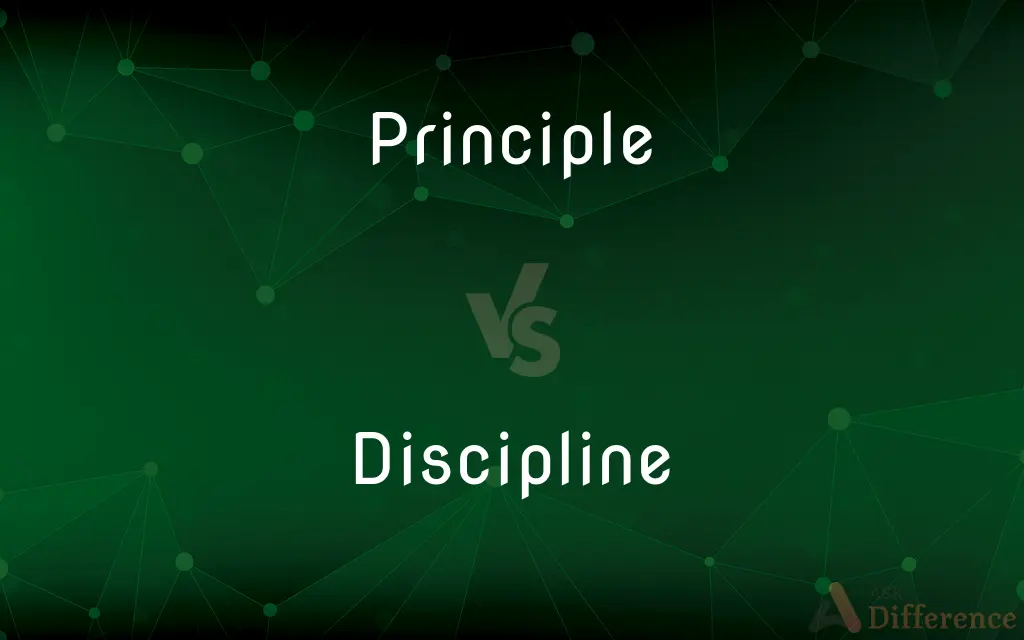Principle vs. Discipline — What's the Difference?
Edited by Tayyaba Rehman — By Fiza Rafique — Updated on October 25, 2023
A "principle" refers to a foundational belief or rule, while "discipline" denotes a controlled behavior or a field of study. Principles guide actions, whereas discipline is the practice or enforcement of controlled behavior.

Difference Between Principle and Discipline
Table of Contents
ADVERTISEMENT
Key Differences
"Principle" and "discipline" are terms with distinct meanings but can occasionally intersect in context. A principle stands for a basic belief, idea, or rule that guides behavior, decision-making, or judgments. It acts as a moral compass, determining what is deemed right or wrong. For example, honesty can be a principle someone adheres to.
On the other side, "discipline" carries a dual meaning. It can refer to the practice of training oneself to behave in a controlled and habitual way, often to achieve a particular goal. In this sense, discipline can be seen as the method or regimen through which one adheres to certain principles. For instance, if a principle is maintaining good health, then regular exercise can be the discipline that supports it.
"Discipline" also points towards an academic or professional field of study or expertise. For instance, biology, mathematics, and history are all disciplines. Here, the link between "principle" and "discipline" can be drawn as each discipline has foundational principles or axioms that underpin its theories and practices.
While both terms are instrumental in shaping behavior and thought processes, their core distinction lies in their application. Principles often provide the "why" — the underlying reason or belief behind an action, while discipline offers the "how" — the consistent practice or method to uphold or achieve those principles.
Comparison Chart
Basic Definition
A foundational belief or rule.
Controlled behavior or a field of study.
ADVERTISEMENT
Role in Behavior
Provides the moral or logical reason for an action.
Method or regimen through which principles are upheld.
In Academia
Core tenets or beliefs underpinning a theory or method.
A branch of knowledge or learning.
Example Usage
"It's against my principles to lie."
"He studied multiple disciplines at the university."
Associated Terms
Values, tenets, beliefs.
Training, field, study, expertise.
Compare with Definitions
Principle
An accepted or professed rule of action or conduct.
She lives by the principle of kindness.
Discipline
Training to act in accordance with specific rules or a code.
Martial arts teach both physical skills and discipline.
Principle
A basic idea or theory explaining an entire system.
The principles of economics guide financial decisions.
Discipline
Discipline is action or inaction that is regulated to be in accordance (or to achieve accord) with a particular system of governance. Discipline is commonly applied to regulating human and animal behavior to its society or environment it belongs.
Principle
A law or fact of nature underlying the working of an artificial device.
The principle behind the steam engine revolutionized transportation.
Discipline
Training expected to produce a specific character or pattern of behavior, especially training that produces moral or mental improvement
Was raised in the strictest discipline.
Principle
A principle is a proposition or value that is a guide for behavior or evaluation. In law, it is a rule that has to be or usually is to be followed.
Discipline
Control obtained by enforcing compliance or order
Military discipline.
Principle
A fundamental truth or proposition that serves as the foundation for a system of belief or behaviour or for a chain of reasoning
The basic principles of justice
Discipline
Controlled behavior resulting from disciplinary training; self-control
Dieting takes a lot of discipline.
Principle
A general scientific theorem or law that has numerous special applications across a wide field.
Discipline
A state of order based on submission to rules and authority
A teacher who demanded discipline in the classroom.
Principle
A fundamental source or basis of something
The first principle of all things was water
Discipline
Punishment intended to correct or train
Subjected to harsh discipline.
Principle
A basic truth, law, or assumption
The principles of democracy.
Discipline
A set of rules or methods, as those regulating the practice of a church or monastic order.
Principle
A rule or standard, especially of good behavior
A man of principle.
Discipline
A branch of knowledge or teaching
The discipline of mathematics.
Principle
The collectivity of moral or ethical standards or judgments
A decision based on principle rather than expediency.
Discipline
To train by instruction and practice, as in following rules or developing self-control
The sergeant disciplined the recruits to become soldiers.
Principle
A fixed or predetermined policy or mode of action.
Discipline
To punish in order to gain control or enforce obedience.
Principle
A basic or essential quality or element determining intrinsic nature or characteristic behavior
The principle of self-preservation.
Discipline
To impose order on
Needed to discipline their study habits.
Principle
A rule or law concerning the functioning of natural phenomena or mechanical processes
The principle of jet propulsion.
Discipline
A controlled behaviour; self-control.
Principle
(Chemistry) One of the elements that compose a substance, especially one that gives some special quality or effect.
Discipline
An enforced compliance or control.
Principle
A basic source. See Usage Note at principal.
Discipline
A systematic method of obtaining obedience.
Principle
A fundamental assumption or guiding belief.
We need some sort of principles to reason from.
Discipline
A state of order based on submission to authority.
Principle
A rule used to choose among solutions to a problem.
The principle of least privilege holds that a process should only receive the permissions it needs.
Discipline
A set of rules regulating behaviour.
Principle
Moral rule or aspect.
I don't doubt your principles.
You are clearly a person of principle.
It's the principle of the thing; I won't do business with someone I can't trust.
Discipline
A punishment to train or maintain control.
Principle
(physics) A rule or law of nature, or the basic idea on how the laws of nature are applied.
Bernoulli's Principle
The Pauli Exclusion Principle prevents two fermions from occupying the same state.
The principle of the internal combustion engine
Discipline
A specific branch of knowledge or learning.
Principle
A fundamental essence, particularly one producing a given quality.
Many believe that life is the result of some vital principle.
Discipline
A category in which a certain art, sport or other activity belongs.
Principle
A source, or origin; that from which anything proceeds; fundamental substance or energy; primordial substance; ultimate element, or cause.
Discipline
(transitive) To train someone by instruction and practice.
Principle
An original faculty or endowment.
Discipline
(transitive) To teach someone to obey authority.
Principle
(obsolete) A beginning.
Discipline
(transitive) To punish someone in order to (re)gain control.
Principle
(transitive) To equip with principles; to establish, or fix, in certain principles; to impress with any tenet or rule of conduct.
Discipline
(transitive) To impose order on someone.
Principle
Beginning; commencement.
Doubting sad end of principle unsound.
Discipline
The treatment suited to a disciple or learner; education; development of the faculties by instruction and exercise; training, whether physical, mental, or moral.
Wife and children are a kind of discipline of humanity.
Discipline aims at the removal of bad habits and the substitution of good ones, especially those of order, regularity, and obedience.
Principle
A source, or origin; that from which anything proceeds; fundamental substance or energy; primordial substance; ultimate element, or cause.
The soul of man is an active principle.
Discipline
Training to act in accordance with established rules; accustoming to systematic and regular action; drill.
Their wildness lose, and, quitting nature's part,Obey the rules and discipline of art.
Principle
An original faculty or endowment.
Nature in your principles hath set [benignity].
Those active principles whose direct and ultimate object is the communication either of enjoyment or suffering.
Discipline
Subjection to rule; submissiveness to order and control; habit of obedience.
The most perfect, who have their passions in the best discipline, are yet obliged to be constantly on their guard.
Principle
A fundamental truth; a comprehensive law or doctrine, from which others are derived, or on which others are founded; a general truth; an elementary proposition; a maxim; an axiom; a postulate.
Therefore, leaving the principles of the doctrine of Christ, let us go on unto perfection.
A good principle, not rightly understood, may prove as hurtful as a bad.
Discipline
Severe training, corrective of faults; instruction by means of misfortune, suffering, punishment, etc.
A sharp discipline of half a century had sufficed to educate us.
Principle
A settled rule of action; a governing law of conduct; an opinion or belief which exercises a directing influence on the life and behavior; a rule (usually, a right rule) of conduct consistently directing one's actions; as, a person of no principle.
All kinds of dishonesty destroy our pretenses to an honest principle of mind.
Discipline
Correction; chastisement; punishment inflicted by way of correction and training.
Giving her the discipline of the strap.
Principle
Any original inherent constituent which characterizes a substance, or gives it its essential properties, and which can usually be separated by analysis; - applied especially to drugs, plant extracts, etc.
Cathartine is the bitter, purgative principle of senna.
Discipline
The subject matter of instruction; a branch of knowledge.
Principle
To equip with principles; to establish, or fix, in certain principles; to impress with any tenet, or rule of conduct, good or ill.
Governors should be well principled.
Let an enthusiast be principled that he or his teacher is inspired.
Discipline
The enforcement of methods of correction against one guilty of ecclesiastical offenses; reformatory or penal action toward a church member.
Principle
A basic generalization that is accepted as true and that can be used as a basis for reasoning or conduct;
Their principles of composition characterized all their works
Discipline
Self-inflicted and voluntary corporal punishment, as penance, or otherwise; specifically, a penitential scourge.
Principle
A rule or standard especially of good behavior;
A man of principle
He will not violate his principles
Discipline
A system of essential rules and duties; as, the Romish or Anglican discipline.
Principle
A basic truth or law or assumption;
The principles of democracy
Discipline
To educate; to develop by instruction and exercise; to train.
Principle
A rule or law concerning a natural phenomenon or the function of a complex system;
The principle of the conservation of mass
The principle of jet propulsion
The right-hand rule for inductive fields
Discipline
To accustom to regular and systematic action; to bring under control so as to act systematically; to train to act together under orders; to teach subordination to; to form a habit of obedience in; to drill.
Ill armed, and worse disciplined.
His mind . . . imperfectly disciplined by nature.
Principle
Rule of personal conduct
Discipline
To improve by corrective and penal methods; to chastise; to correct.
Has he disciplined Aufidius soundly?
Principle
(law) an explanation of the fundamental reasons (especially an explanation of the working of some device in terms of laws of nature);
The rationale for capital punishment
The principles of internal-combustion engines
Discipline
To inflict ecclesiastical censures and penalties upon.
Principle
A fundamental truth serving as a foundation.
The principle of gravity explains why objects fall to the ground.
Discipline
A branch of knowledge;
In what discipline is his doctorate?
Teachers should be well trained in their subject
Anthropology is the study of human beings
Principle
A moral standard or rule of conduct.
Integrity is a key principle in our company.
Discipline
A system of rules of conduct or method of practice;
He quickly learned the discipline of prison routine
For such a plan to work requires discipline
Discipline
The trait of being well behaved;
He insisted on discipline among the troops
Discipline
Training to improve strength or self-control
Discipline
The act of punishing;
The offenders deserved the harsh discipline they received
Discipline
Train by instruction and practice; especially to teach self-control;
Parents must discipline their children
Is this dog trained?
Discipline
Punish in order to gain control or enforce obedience;
The teacher disciplined the pupils rather frequently
Discipline
A controlled behavior resulting from such training.
Her discipline in daily meditation is commendable.
Discipline
A branch of knowledge or instruction.
Philosophy is a discipline that questions existence.
Discipline
Punishment aimed at training or correcting.
The school has a strict discipline policy for misbehavior.
Discipline
A set of rules regulating a particular field or activity.
The discipline of journalism requires fact-checking.
Common Curiosities
Can a person have principles related to discipline?
Absolutely, one might have the principle of maintaining regularity and discipline in their daily tasks.
Is biology a principle or a discipline?
Biology is a discipline, an academic field of study.
What is the main difference between Principle and Discipline?
Principle refers to a foundational belief or rule, while discipline can denote controlled behavior or a field of study.
Can principles guide discipline?
Yes, principles often provide the foundational beliefs that discipline seeks to uphold or achieve.
Is discipline always about strict behavior?
No, while discipline often involves controlled behavior, it can also refer to a field of study.
Which term, principle or discipline, relates to punishment?
Discipline can refer to punishment aimed at training or correcting.
Is "honesty" a principle or a discipline?
Honesty is a principle, a foundational belief or rule guiding behavior.
Can disciplines have foundational principles?
Yes, academic or professional disciplines often have foundational principles or axioms that underpin them.
Is mathematics a principle or discipline?
Mathematics is a discipline, a branch of academic study.
Are principles always moral in nature?
While many principles relate to moral beliefs, they can also be foundational truths or theories in various fields.
Can one's principles change over time?
Yes, as individuals grow and evolve, their principles might shift based on experiences and learning.
How do principles affect decision-making?
Principles provide the foundational beliefs or rules that guide an individual's decisions and actions.
Can disciplines overlap in academia?
Yes, disciplines can be interdisciplinary, blending concepts from multiple fields.
How does discipline relate to expertise?
Discipline, as a field of study, contributes to gaining expertise in that specific area.
Can a business have guiding principles?
Yes, businesses often have guiding principles that dictate their values and operational standards.
Share Your Discovery

Previous Comparison
Lemon vs. Citrus
Next Comparison
Metric vs. MeasureAuthor Spotlight
Written by
Fiza RafiqueFiza Rafique is a skilled content writer at AskDifference.com, where she meticulously refines and enhances written pieces. Drawing from her vast editorial expertise, Fiza ensures clarity, accuracy, and precision in every article. Passionate about language, she continually seeks to elevate the quality of content for readers worldwide.
Edited by
Tayyaba RehmanTayyaba Rehman is a distinguished writer, currently serving as a primary contributor to askdifference.com. As a researcher in semantics and etymology, Tayyaba's passion for the complexity of languages and their distinctions has found a perfect home on the platform. Tayyaba delves into the intricacies of language, distinguishing between commonly confused words and phrases, thereby providing clarity for readers worldwide.














































